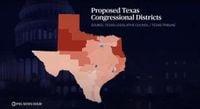In a fierce political showdown unfolding in Texas, Democratic lawmakers and civil rights groups are rallying against a Republican-led redistricting plan that critics say is designed to cement GOP control of the U.S. House of Representatives. The controversy centers on new congressional maps released in late July 2025, which Democrats and voting rights advocates argue dilute the voting power of Black and Latino communities and pit prominent Democratic incumbents against each other.
Republican lawmakers, urged on by former President Donald Trump, have pushed for a rare mid-decade redrawing of Texas’ congressional districts. The goal, according to GOP officials, is to realign districts with the state’s shifting population and increase Republican competitiveness. Trump publicly called for the redrawing, saying in July, “Just a very simple redrawing, we pick up five seats,” highlighting the stakes ahead of the 2026 midterm elections.
However, Democrats see the effort as a blatant power grab. Democratic Rep. Jasmine Crockett testified at a state capitol hearing on August 1, 2025, that the proposed maps would draw her out of the district where she lives, a move she called a “red flag.” She alleged other members have been similarly displaced and condemned the maps as “discriminatory,” stating they “do nothing but divide, distract and depress.”
Rep. Lloyd Doggett, a veteran Democrat representing Texas’ 37th Congressional District, warned that the maps were a “Trump map” imposed by the former president to maintain his grip on Congress. Doggett pointed out that while more than half of his constituents remain in the new district, he and fellow Democrat Rep. Greg Casar would be forced to compete for a single seat in Austin, setting up a potentially brutal primary battle within the Congressional Progressive Caucus.
This intra-party conflict underscores a bitter generational divide. Casar, 36, is viewed as a rising star, while Doggett, 78 and first elected in 1994, faces pressure from colleagues to step aside. One House Democrat told Axios, “He was one of the first people to call for President Biden to step aside for new leaders, and I think this may be one of those moments.” Doggett himself stressed unity, saying, “Promoting this type of division and infighting is exactly what Republicans want. Greg and I are both committed to working together to stop this outrageous gerrymandering.”
Beyond individual battles, the broader redistricting plan has sparked outrage from civil rights groups and labor unions. Roman Palomares, national president of the League of United Latin American Citizens (LULAC), called the redistricting “a hijacking of democracy in plain sight,” accusing Republicans of rewriting the rules midstream to entrench their power. He warned that Black and Brown voters would bear the brunt of the changes, with communities being carved up or packed into districts to dilute their influence.
Rep. Henry Cuellar, whose heavily Latino district in San Antonio would be fragmented, labeled the plan an “illegal power grab” rooted in racism. Similarly, the International Association of Machinists and Aerospace Workers (IAM Union) condemned the effort as a “power grab” by “extremist right-wing politicians” aligned with Trump and corporate interests. IAM leaders urged members and citizens to demand fair maps and fair representation, emphasizing that Texas is being used as a “testing ground for Trump-style politics.”
The redistricting battle is unfolding amid other pressing issues in Texas. Governor Greg Abbott called lawmakers back for a special legislative session in late July 2025, which also includes addressing deadly floods that recently devastated parts of Texas Hill Country. Critics like Democratic Rep. Salman Bhojani say Republicans have prioritized political maneuvering over disaster relief, contrasting Texas’ approach unfavorably with New Mexico’s focused response to similar crises.
Bhojani, part of a Texas House Democratic Caucus delegation that traveled to New Mexico to seek allies against the redistricting plan, criticized the seven redistricting hearings held without releasing maps and the timing of the flood relief hearings. He described the redistricting as “an assault on Texans’ voting rights” and warned that the fight in Texas could have ripple effects nationwide.
Democrats have vowed to resist the redistricting through lawsuits and legislative tactics, including the possibility of breaking quorum to block the plan’s passage. Such a move, used in previous Texas redistricting battles, would require lawmakers to leave the state to avoid arrest and face daily fines. Rep. Gene Wu, chair of the Texas House Democratic Caucus, and others have indicated all options remain on the table.
The legal backdrop complicates matters further. The U.S. Supreme Court ruled in 2019 that federal courts cannot police partisan gerrymandering, limiting judicial recourse. Meanwhile, a controversial July 7, 2025, letter from the Justice Department’s civil rights division to Texas GOP leadership accused the current map of unconstitutional racial gerrymanders, contradicting earlier Republican testimony that the map was “blind to race.” Critics say this letter provided a “shallow pretext” for the redistricting push.
As the 60th anniversary of the Voting Rights Act of 1965 approaches, advocates warn that the battle over Texas’ maps is emblematic of ongoing struggles to protect voting rights and fair representation. Kathleen Thompson, executive director of the Progress Texas Institute, noted, “Sixty years later, white guys are still calling each other and saying how Brown and Black citizens can vote.”
The stakes are high not only for Texas but for the balance of power in Congress. Republican Sen. John Cornyn defended the new maps, saying, “Texas has changed, like many other states, and there are a lot more Republican voters, and they’re underrepresented in the current maps.” He argued the redistricting aligns population changes with fair representation.
Yet, for many Texans, the redistricting fight is about more than numbers — it’s about democracy itself. The protests outside the state capitol and the fierce debates inside reflect deep divisions over who gets to decide the state’s political future and how. As the battle continues, all eyes remain on Texas, a state that may well determine the shape of American politics for years to come.


